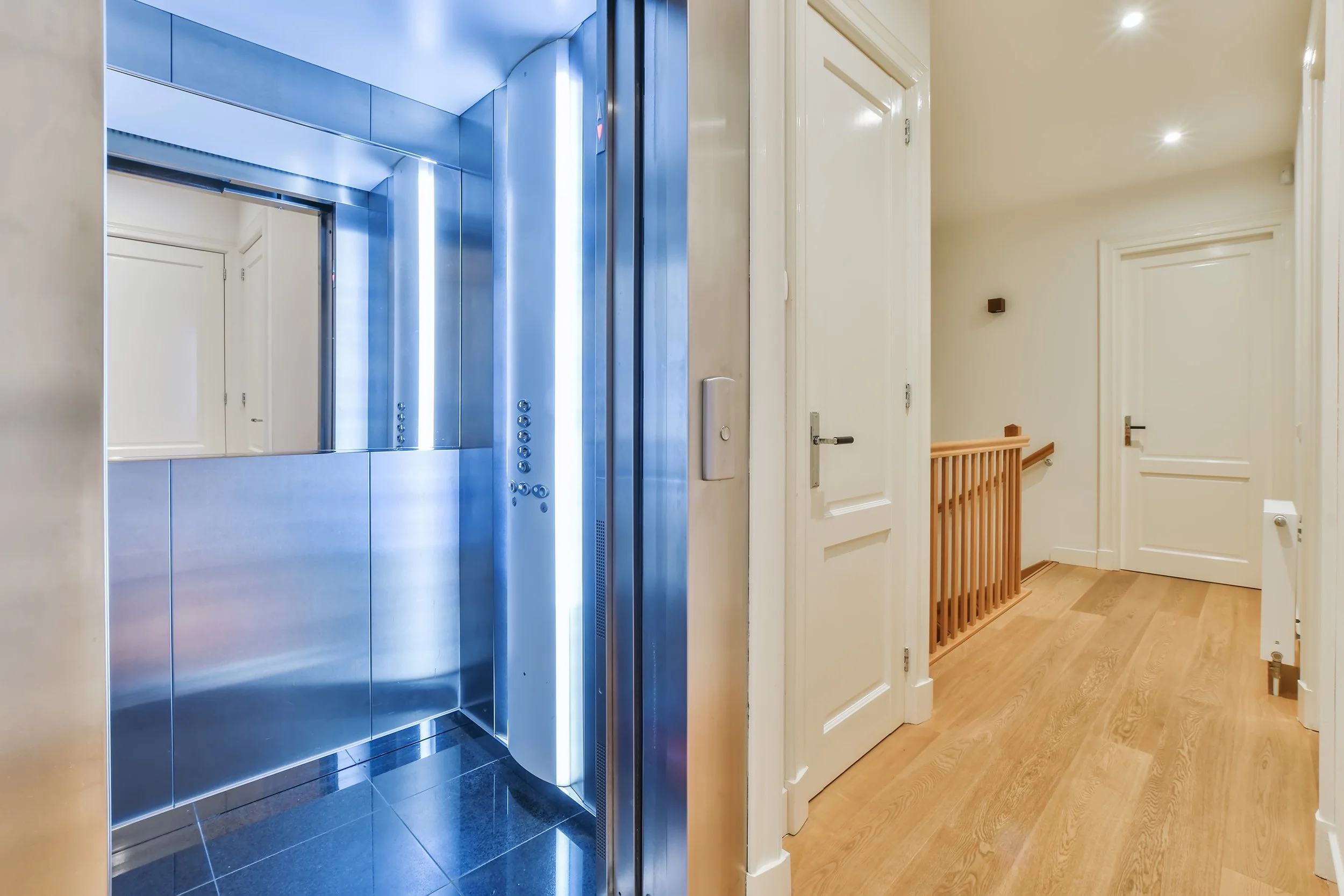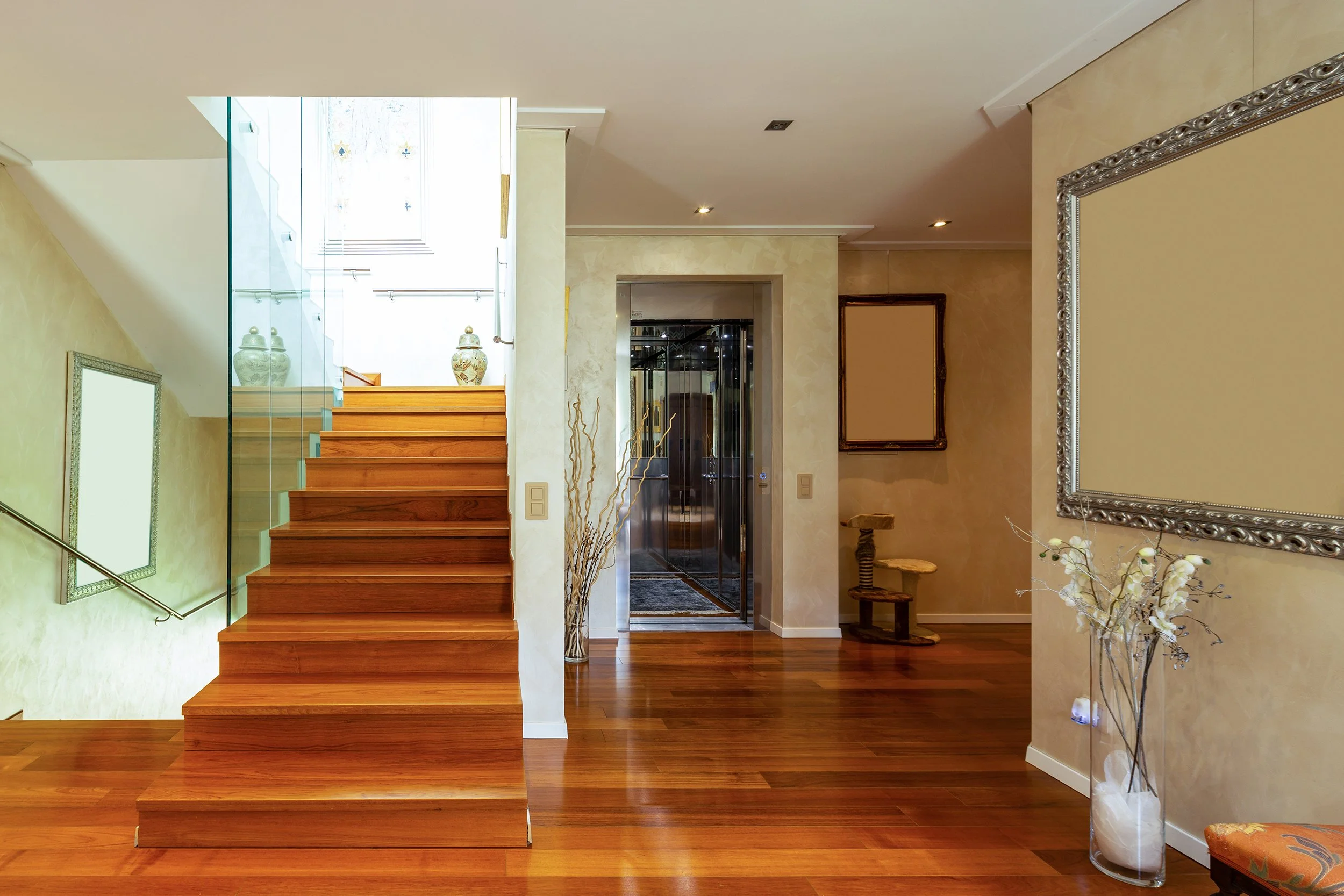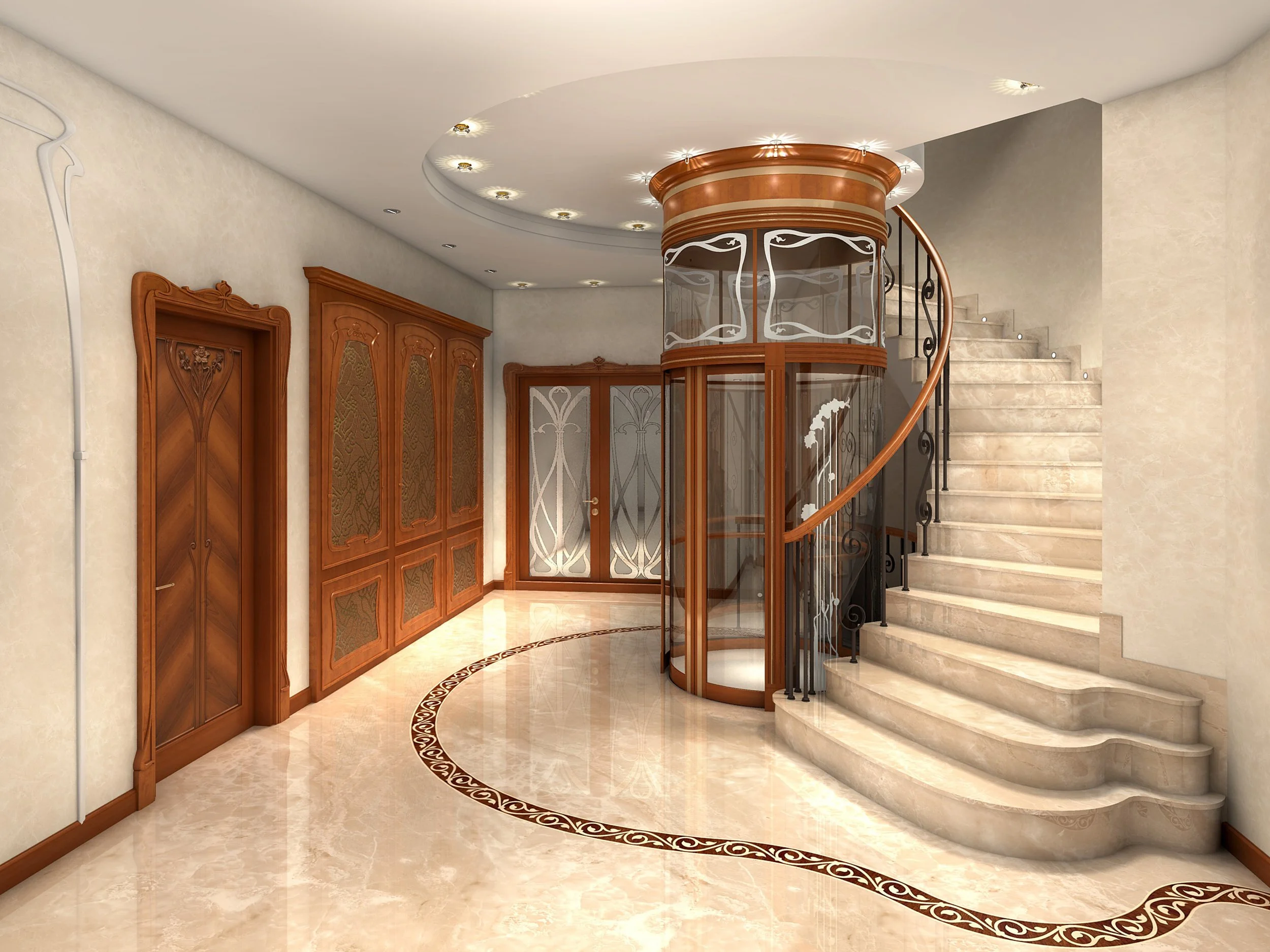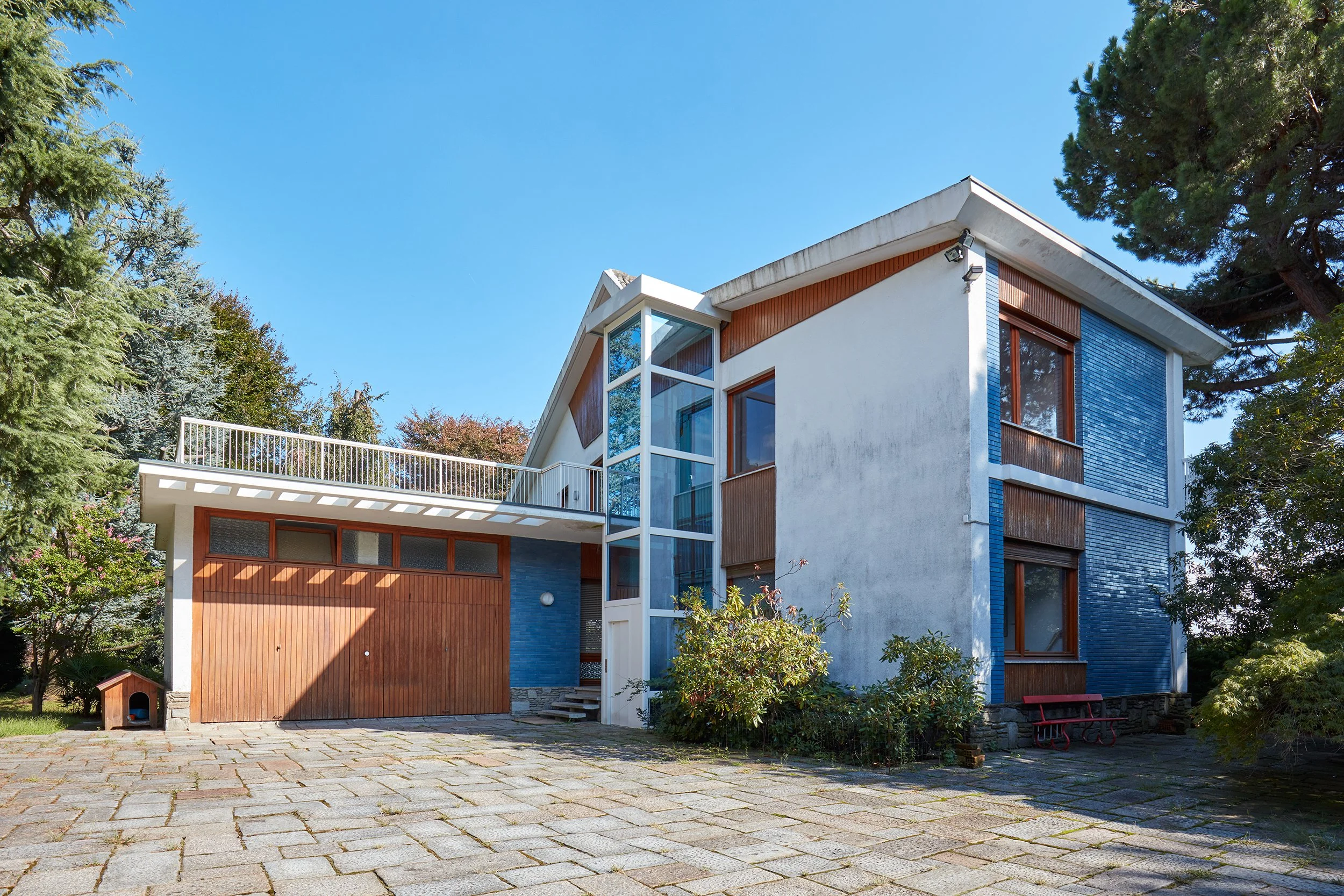Residential Elevator Cost: The Complete Guide to Luxury Home Elevator Investment and Planning

Here's a startling reality: 54 million Americans live with mobility challenges, and with 10,000 baby boomers turning 65 every day, residential elevator installations have surged 40% since 2020. Yet most homeowners dramatically underestimate both the investment required and the transformative value these systems deliver.
Installing a home elevator isn't just about moving between floors—it's about future-proofing your most valuable asset while creating an accessible sanctuary that adapts to life's changing needs. Whether you're planning for multigenerational living, addressing current mobility requirements, or adding that unmistakable hallmark of luxury living, understanding elevator costs becomes crucial for making this significant investment decision wisely.
The home elevator market has evolved far beyond basic utility, with modern installations spanning a wide range of options and price points. But here's what most cost guides won't tell you: the difference between a smart investment and an expensive mistake often lies in understanding the hidden factors that drive real-world pricing.
In Colorado's challenging high-altitude environment, where dramatic weather patterns and specialized installation requirements create unique considerations, elevator projects typically run 15-25% above national averages—a significant commitment that demands thorough planning and expert execution.
This comprehensive guide reveals everything you need to know about home elevator pricing, from base costs and hidden expenses to ROI calculations and Colorado-specific factors that impact your investment. We'll help you navigate this complex decision with the confidence that comes from understanding exactly what you're buying and why quality matters more than ever in today's competitive market.
Understanding Home Elevator Types and Their Cost Ranges
Pneumatic Vacuum Elevators: $25,000 - $50,000
Pneumatic elevators represent the most affordable entry point into home elevator ownership. These transparent tube-style elevators use air pressure differences to move between floors, requiring no machine room or pit excavation. Installation typically takes 1-2 days, making them ideal for existing homes where structural modifications are challenging.
Hydraulic Elevators: $35,000 - $75,000
Hydraulic systems dominate the home elevator market due to their reliability and smooth operation. These elevators use fluid pressure to lift the cab, providing quiet operation and precise leveling at each floor. Installation requires a machine room and may need pit excavation, but delivers superior performance and longevity.
Traction Elevators: $45,000 - $90,000
Traction elevators use cables and counterweights to provide the smoothest, quietest operation available. These systems excel in multi-story homes where travel distance and frequency of use demand premium performance. Many luxury homeowners consider traction systems the gold standard.
Custom Luxury Elevators: $75,000 - $150,000+
High-end custom installations feature premium finishes, advanced control systems, and architectural integration. These projects often include custom cab designs, specialty materials, and smart home integration that transforms elevators into stunning home features.
Key Factors That Drive Home Elevator Costs
Home Configuration and Structural Requirements
Your home's existing structure significantly impacts installation complexity and cost. Multi-story installations increase costs proportionally, with each additional floor adding $8,000-$15,000 to the total project. Basement installations often require specialized waterproofing and ventilation considerations.
Customization and Finish Selections
Standard elevator cabs feature basic finishes that keep costs manageable. Upgrading to premium materials like hardwood panels, stone flooring, or architectural glass can add $15,000-$40,000 to your project. Advanced control systems, including smartphone integration, represent emerging trends for tech-savvy homeowners.
Building Codes and Permit Requirements
Home elevators must comply with local building codes and safety regulations. Permit costs typically range from $500-$2,500, though complex installations may require additional engineering fees. Working with experienced contractors prevents costly delays and modifications.
Site Access and Installation Challenges
Delivering elevator components and maneuvering them into position affects installation costs. Difficult access or multi-story deliveries may require specialized equipment that increases project expenses. Properties with unique features or HOA restrictions often require additional planning processes.
Home Elevator Installation Cost Breakdown
Professional Design and Engineering: $3,000 - $8,000
Licensed engineers evaluate load requirements, electrical systems, and structural modifications needed for safe installation. This upfront investment prevents costly errors and ensures code compliance.
Structural Modifications: $5,000 - $25,000
Most installations require shaft construction, floor openings, and reinforcement. Retrofit installations typically need more extensive modifications than new construction, with complexity depending on your home's age and existing layout.
Electrical and Control Systems: $4,000 - $12,000
Dedicated circuits, control panels, and safety systems meeting strict code requirements. Advanced features like smart home integration and emergency communication increase costs but provide enhanced functionality.
Labor and Project Management: $8,000 - $20,000
Skilled installation teams coordinate multiple trades throughout the project. Professional coordination becomes essential for complex installations requiring precise execution and timing.
Ongoing Home Elevator Costs and Maintenance
Annual Operating Expenses: $1,400 - $4,100
Professional maintenance contracts ($1,200-$3,000 annually) ensure safe operation through regular inspections, lubrication, and adjustments. Energy consumption adds $200-$600 yearly, comparable to running a household appliance. Budget $500-$1,500 annually for unexpected repairs, though well-maintained systems require minimal intervention during their first decade.
Insurance providers may require annual safety inspections ($200-$500), and some policies increase premiums slightly. However, elevators can improve accessibility and potentially reduce liability concerns. Major component replacements typically occur after 15-20 years, costing $5,000-$15,000 depending on system complexity.
Return on Investment and Property Value Impact
When Elevators Add Significant Value
Home elevators typically add 5-10% to property value in luxury markets where they're expected amenities. Multi-story homes over 4,000 square feet see the strongest value increases, especially when elevators provide access to previously underutilized spaces.
Market Considerations
Elevator appeal varies significantly by geographic market and buyer demographics. Areas with older populations or luxury home markets generally provide stronger returns than markets focused on young families. Quality installation and attractive design integration maximize buyer appeal and value recovery.
Long-term Financial Benefits
Beyond property value, home elevators provide long-term financial benefits through enhanced accessibility that may prevent costly modifications or premature downsizing decisions. The ability to age in place safely can save hundreds of thousands in alternative housing costs.
Colorado-Specific Home Elevator Considerations
Living in Colorado presents unique installation challenges that create both opportunities and constraints for elevator projects. The state's high altitude, intense UV exposure, dramatic temperature fluctuations, and diverse weather patterns affect your home differently than properties at sea level.
Critical Planning Considerations: Colorado's limited construction season and specialized contractor availability make early planning essential for successful project completion.
High Altitude Impact on Home Systems
Colorado's elevation affects elevator performance in ways many homeowners don't anticipate. Hydraulic systems may require pressure adjustments for optimal operation at altitude, while electrical components need protection from intense UV exposure. Mountain communities face additional challenges including difficult site access and specialized contractor requirements that can impact project timelines and costs.
Seasonal Installation Windows and Weather Patterns
Construction Season Reality: Colorado's construction season runs April through October, with elevator contractors booking 4-6 months in advance. Rapid weather changes can create 40+ degree temperature swings in a single day, making timing crucial for project success.
May through September brings hail threats to Front Range communities, while early snowstorms can arrive as soon as September. Boulder-area homeowners typically invest $45,000-$95,000 for quality hydraulic installations, representing the 15-25% premium above national averages.
Contractor Availability and Market Constraints
Colorado has fewer than 12 certified elevator contractors serving the entire Front Range, with only 3-4 specializing in luxury installations. This scarcity creates extended booking windows, with quality contractors often booking through the following year by February.
Financing Your Home Elevator Investment
Home Equity and Refinancing Options
Most homeowners finance elevator installations through home equity loans or lines of credit offering favorable interest rates and potential tax advantages. Cash-out refinancing can provide funding while potentially improving overall mortgage terms when property values have appreciated significantly.
Specialized Programs and Medical Financing
Some manufacturers offer financing programs with competitive rates tailored to elevator projects. Medical necessity financing may be available for installations required for mobility needs, potentially offering favorable terms or tax advantages. Documentation from medical professionals strengthens claims for insurance coverage or tax deductions.
Budget Planning
Successful projects require comprehensive budget planning with 10-15% contingency funds for unexpected complications. Value engineering during design phases can optimize costs without compromising safety or functionality.
Making the Right Investment Decision for Your Home
Planning Reality and Market Pressure: Optimal timing for elevator installation depends on your home's lifecycle and family needs, but Colorado's constraints make early decision-making critical. New construction or major renovation projects provide the most cost-effective opportunities for elevator integration.
Current Market Dynamics: Material costs have increased 18% since 2023, with industry experts predicting another 10-15% increase through 2025 as baby boomer demand accelerates. Planning before acute mobility needs arise ensures thoughtful design integration and avoids premium rush pricing.
Evaluating Long-term Value
Successful elevator investments balance immediate functionality with long-term value creation. Quality installation using reputable contractors and premium components provides the best long-term value through reliable operation and strong warranty protection.
Professional Project Coordination
Home elevator installation involves coordinating multiple contractors, managing complex permitting processes, and ensuring quality execution throughout extended project timelines. Current contractor shortages mean project delays compound quickly when coordination fails.
Coordination Risk: A delayed electrical contractor can push your entire project into winter weather, potentially adding $10,000-$25,000 in weather protection and storage costs.
Professional project management becomes invaluable, handling contractor coordination, schedule management, and quality oversight. Services like WillowHome specialize in managing complex home improvement projects, providing the single point of contact and expert coordination that elevator installations demand. Their experience with high-end Boulder area projects and established contractor networks streamlines the installation process while ensuring quality execution.
Quality vs. Cost Considerations
Home elevator installation represents a significant long-term investment where quality considerations outweigh initial cost savings. Reputable manufacturers, experienced installers, and proper engineering ensure safe, reliable operation that justifies premium pricing through superior performance and longevity.
Budget-focused decisions often result in higher long-term costs through increased maintenance, earlier replacement, or safety concerns that compromise the investment value. Prioritizing quality provides better financial returns and peace of mind throughout your elevator's operational life.
Frequently Asked Questions
What factors most significantly impact home elevator cost?
Elevator type, home configuration, and customization level represent the primary cost drivers. Standard installations range from $25,000 for pneumatic systems to $150,000+ for custom luxury installations. Structural modifications for retrofit installations often add $10,000-$30,000 to base costs.
How long does home elevator installation typically take?
Installation timelines vary from 2-3 days for pneumatic elevators to 6-12 weeks for complex custom installations. Weather, permit approval, and contractor availability can extend timelines, particularly in Colorado mountain communities.
How much value does a home elevator add to sale price?
Well-designed installations typically add 5-10% to property value in appropriate markets, though value recovery varies significantly by location, home price point, and buyer demographics. Luxury markets and areas with older populations generally provide stronger returns.
What ongoing maintenance costs should homeowners expect?
Annual maintenance contracts cost $1,200-$3,000, energy costs range $200-$600 annually, while unexpected repairs typically average $500-$1,500 per year for well-maintained systems.
Can elevators be installed in existing homes without major renovation?
Most homes can accommodate installation, though structural modifications vary significantly. Pneumatic elevators require minimal modifications, while hydraulic and traction systems may need shaft construction and machine room installation.
Timing Critical: Retrofit installations during winter months often cost 20-30% more due to heating requirements, material protection, and limited contractor availability.
Are there financing options specifically for home elevator installation?
Home equity loans provide the most common financing, though some manufacturers offer specialized programs. Medical necessity installations may qualify for insurance coverage or tax deductions.
What should I look for when selecting an elevator contractor?
Prioritize licensed contractors with extensive home elevator experience, strong local references, and comprehensive insurance coverage. Verify manufacturer certifications and ensure contractors understand local building codes and permit requirements.
Your Trusted Partner for Coordinating Home Maintenance and Upgrades in Boulder & Denver
Why WillowHome Makes the Difference
Installing a home elevator in Colorado isn't just another home improvement project—it's a complex orchestration of specialized contractors, strict timelines, and significant investment. With fewer than 12 certified elevator contractors serving the entire Front Range and booking windows extending 4-6 months, the coordination challenges can quickly overwhelm even the most organized homeowner.
That's where WillowHome's luxury home concierge services transform a potentially stressful experience into a seamlessly managed project. As your single point of contact throughout the entire installation process, WillowHome brings the expertise, connections, and coordination skills that Colorado's unique market demands.
From initial design consultations through final inspections, WillowHome manages every aspect of your elevator installation. Our established relationships with the region's top contractors mean faster booking times and priority scheduling—critical advantages in Colorado's limited construction season.
Disclaimer
This content provides general information about home elevator costs for educational purposes only. Elevator pricing varies significantly based on specific property conditions, local building codes, and individual project requirements that cannot be accurately assessed without professional evaluation.
All cost estimates reflect general market ranges and should not be considered binding quotes. Professional consultation with licensed elevator contractors, engineers, and building officials is essential for accurate project planning and cost estimation.
Home elevator installation involves complex safety, structural, and electrical considerations requiring qualified professionals. Building codes and installation standards vary by jurisdiction. Always verify current local requirements and obtain proper permits before beginning projects.
Get Started with Home Management
At Willow, we take a proactive approach to home care, ensuring your home remains in pristine condition year-round. From routine maintenance and seasonal upkeep to coordinating trusted vendors for repairs and upgrades, we handle it all with a high-touch, concierge-style experience tailored to your needs.
Let us take home management off your plate. Contact Willow today to learn how our services can help you protect, maintain, and enhance your home with ease.
Willow is a luxury home concierge service based in Boulder, Colorado. We care about your home and giving you back your time to do the things you care about most.
How it Works





